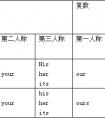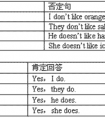句型转换. 1. I can't decide which one I should buy.(改为简单句)I can't decide which one _____ _____.2. I think the school uniform are very nice. (就划线部-七年级英语
题文
| 句型转换. |
| 1. I can't decide which one I should buy.(改为简单句) I can't decide which one _____ _____. 2. I think the school uniform are very nice. (就划线部分提问) _____ _____ you think about the school uniform? 3. Why not keep an English notebook? (改为同义句) Why ______ _____ keep an English notebook? 4. Miss Gao has taught English for nearly six years. (就划线部分提问) _____ _____ has Miss Gao taught English? 5. The students had to get to the bus station before seven. (改为反意疑问句) The students had to get to the bus station before seven, _____ _____ ? 6. I have already finished doing my homework. (改为否定句) I _____ finished doing my homework _____. 7. I' like a teaspoon of honey.(就划线部分提问) _____ _____ honey would you like? 8. I get my mother's help by making phone calls.(就划线部分提问) _____ _____ you get your mother's help? |
答案
| 1. to buy 2. What do 3. don't you 4. How long 5. didn't they 6. haven't, yet 7. How much 8. How do |
据专家权威分析,试题“句型转换. 1. I can't decide which one I should buy.(改为..”主要考查你对 不定式,人称代词,疑问代词,疑问副词,副词,助动词 等考点的理解。关于这些考点的“档案”如下:
不定式人称代词疑问代词疑问副词副词助动词
考点名称:不定式
- 动词不定式:
指由to加上动词原形(而且只能是动词原形)所构成的一种非限定性动词,但在有些情况下to可以省略。
动词不定式在语法功能上可作主语、宾语、宾语补足语、表语、定语和状语。 - 动词不定式可以作以上各种成分,但它毕竟是动词,所以有动词的属性。
动词不定式及其短语还可以有自己的宾语、状语,虽然动词不定式在语法上没有表面上的直接主语,但它表达的意义是动作,这一动作一定由使动者发出。
这一使动者我们称之为逻辑主语,其形式如下:
时态 主动形式 被动形式 一般式 (not) to do (not) to be done 完成式 (not) to have done (not) to have been done 进行式 (not) to be doing 完成进行式 (not) to have been doing - 不定式的用法:
1、不定式作主语
例如:To remember this is very important.
注意:为了避免头重脚轻,在许多情况下,通常都将作主语的不定式置于句子后部,而在句首主语位置使用形式主语it。
例如:It is very important to remember this.
2、不定式作表语
例如:He seems to be ill.
注意:不定式作表语主要有三种情况,一是用于seem, appear, prove等系动词之后的不 定式(尤其是to be),
二是像My job is to sweep the floor. 这样的主语与表语“等价”的情形,
三是表示想法、约定、义务、命令、可能性、命运等,如:
You are to come when I call.
3、不定式作宾语
例如:I can not afford to buy a car.
注意:
①不定式不仅用作动词的宾语,还可用作个别介词(but, except)的宾语。
例如:I had no choice but to wait.
②当作宾语的不定式后跟有宾语补足语时,通常要用形式宾语it代替不定式,并将真正的宾语不定式置于宾语补足语之后
例如:I find it difficult to learn Japanese well.
4、不定式作宾语补足语
例如:Who taught you to drive?
5、不定式作定语
例如:I have a question to ask you.
注意:有的名词(如way, chance, right等)后用作不定式可换成of doing sth.
如:It is the best way to do (of doing) it.
但是以下名词后接不定式作定语时通常不能换成of doing sth.
attempt courage decision effort fortune failure invitation wish
6、不定式作状语
例如:I went to France to learn French.
考点名称:人称代词
- 人称代词:
人称代词是用来表示人的代词,有单数和复数之分,有主格和宾格之分。人称代词的主格在句中作主语;人称代词的宾格在句中作宾语,也可作动词或介词的宾语。
主格:I, we, you, he, she, it, they在句子中作主语
宾格:me, us, you, him, her, it, them在句子中作宾语
He and I are in the same class. 我和他在同一个班级。
Can you see them in the street? 你能看见他们在街上吗? 人称代词在句中的作用:
1)主格作主语。如:
I am Chinese.我是中国人。
2)宾格作宾语,放在及物动词或介词之后,有时还可以在口语中用作表语。如:
①I don't know her.我不认识她。(动词宾语)
②What's wrong with it?它怎么了?(介词宾语)
③-Open the door,please.
3)作表语
作表语一般用主格, 但在口语中也常用宾格
I saw at once it was her.我一下子看到了她。
It's me.请开门,是我。(表语)
4)作同位语
作同位语是用宾格
We ,us ,there,will be able to fulfill the task.我们三人就能完成这项任务。- 主宾格的替换:
一、宾格代替主格
a.在简短对话中,当人称代词单独使用或在not后,多用宾语。
---- I like English. --我喜欢英语。
---- Me too. --我也喜欢。
---- Have more wine? --再来点酒喝吗?
---- Not me. --我可不要了。
b.在表示比较的非正式的文体中,常用宾格代替主格。但如果比较状语的谓语保留,则主语只能用主格。
He is taller than I/me.
He is taller than I am.
二、主格代替宾格
a.在介词but,except后,有时可用主格代替宾格。
b.在电话用语中常用主格。
---- I wish to speak to Mary. --我想和玛丽通话。
---- This is she. --我就是玛丽。
注意:在动词be或to be后的人称代词视其前面的名词或代词而定。
I thought it was she. 我以为是她。 (主格----主格)
I thought it to be her. (宾格----宾格)
I was taken to be she. 我被当成了她。 (主格----主格)
They took me to be her.他们把我当成了她。 (宾格----宾格) 人称代词用法:
一、人称代词的宾格在句中作宾语,往往用在动词或介词后面。
例:1.Listen to me,Dad.
2.Peter is sitting behind me.
3.Let me got here now.
4.Give me an orange,please.
二、you既是"你"或"你们"的主格,又是它们的宾格;her既是"她"的所有格,又是它的宾格。我们可以根据它们在句子中的位置来判断它们属于主格、所有格还是宾格。
三、and是一个我们常用来连接两个词的连接词。它虽然与介词with有同样的意思,但它的前后可以是人称代词的主语,也可以是人称代词的宾格,而with只能跟人称代词的宾格。
- 最新内容
- 相关内容
- 网友推荐
- 图文推荐
| [家长教育] 孩子为什么会和父母感情疏离? (2019-07-14) |
| [教师分享] 给远方姐姐的一封信 (2018-11-07) |
| [教师分享] 伸缩门 (2018-11-07) |
| [教师分享] 回家乡 (2018-11-07) |
| [教师分享] 是风味也是人间 (2018-11-07) |
| [教师分享] 一句格言的启示 (2018-11-07) |
| [教师分享] 无规矩不成方圆 (2018-11-07) |
| [教师分享] 第十届全国教育名家论坛有感(二) (2018-11-07) |
| [教师分享] 贪玩的小狗 (2018-11-07) |
| [教师分享] 未命名文章 (2018-11-07) |


![Sunday is my birthday. I would like _____ a birthday party, would you _____to my party? [ ]A. have; come B. to have; to come C. have; to come D. to have-七年级英语](http://www.00-edu.com/d/file/ks/4/2/budingshi/2020-01-08/smalla85122db0c71d7fb6ae58187be7f1fd11578430330.png)

![Why areyou here? You are supposed ______ in the classroom now. [ ] A. to studyB. to be studiedC. studying D. to be studying -九年级英语](http://www.00-edu.com/d/file/ks/4/2/budingshi/2020-01-08/small6dee02daa62cac1c71853ac804ab4fbd1578422460.png)
![She is very poor. Little food _____ and no room _____! [ ]A. to eat, to live B. to eat, to live in C. eating, living -八年级英语](http://www.00-edu.com/d/file/ks/4/2/budingshi/2020-01-09/small17b77c2697a3ef8f1461d0d14b016ee51578585185.png)
